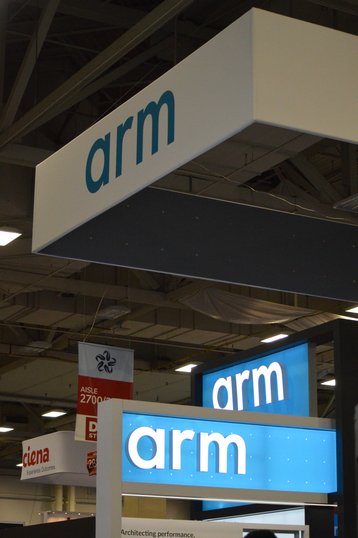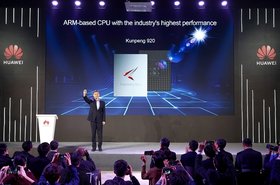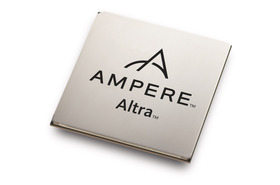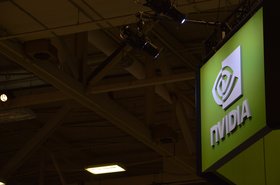Chip designer Arm is up for sale, and Nvidia is thought to be considering making an offer.
The company was acquired by SoftBank in 2016 for $32bn, but its owner has hired Goldman Sachs to explore taking the company public or selling it outright.
Different business models
In recent weeks, GPU giant Nvidia approached the company to discuss acquiring the business, Bloomberg reports, citing people with knowledge of the matter.
Unlike Nvidia, which develops and sells its own chips, Arm relies on licensing. Its designs are sold to companies like Qualcomm, Apple, Amazon, and more, who then add to the design and develop their own products.
This approach means Arm earns significantly less per chip sold, but equally means it ends up in a lot more products. With more than 130 billion Arm processors in the wild, it is the most widely used instruction set architecture in the world, found in smartphones, Internet of Things devices, network processors, and more.
One area the company has repeatedly struggled to break into is the data center server market. While Arm is found elsewhere in a facility, the core CPU of most servers has historically been an x86 chip developed by Intel. In recent years, AMD's Epyc CPUs have gained ground, but they are also x86 products.
There are signs that that stranglehold could be breaking, with this summer alone seeing the debut of the world's most powerful supercomputer boasting Arm chips, a new Arm server, and the unveiling of a 128-core Ampere Arm CPU. Most promising, many in the industry believe, is Amazon Web Service's efforts. Its Graviton processors are relatively powerful in and of themselves, but Arm chip rivals hope that they will help people test the chip architecture cheaply, and boost its software support.
Last year, the instruction set scored another major victory: Nvidia said that it would make its full stack of AI and HPC software available to the Arm ecosystem.
"Arm has been an interesting conversation in high-performance computing (HPC) and the data center space more broadly," Ian Buck, VP and GM of accelerated computing at Nvidia, said at the time.
"Certainly, we've seen lots of interest in Arm, but more recently, there's been a significant uptick. With the announcement made by the European Commission and EPI on exascale, they stated publicly that Arm will be the CPU architecture of choice for European exascale - it's clear that Arm has a bright future in Europe. With the work being done in Japan with Riken and the Post-K systems there, Arm also is the CPU of choice for Japanese exascale.
"For Nvidia, we feel that Arm has reached a tipping point in that conversation and we want to help it succeed."
The GPU company, worth $257 billion before news of the potential acquisition broke, has been on a spending spree as of late. This year, its $6.9bn acquisition of networking company Mellanox closed, and was quickly followed by the news that it would swallow Cumulus.
But a deal to acquire Arm would be its biggest move yet, and - if it could pass regulators - would be the largest transaction in semiconductor history. Broadcom almost set a higher record when it tried to acquire Qualcomm in a $117bn hostile takeover, but the deal was blocked by the US government over national security grounds.
A different owner
Also at one point involved in sales discussions was Apple, which this year announced its Macs would soon use Arm-licensed chips designed in-house.
Arm reportedly contacted the company and preliminary discussions were held, but the idea was not pursued further.
Arm's length
When it acquired Arm, Japanese telecoms giant SoftBank promised to let the business mostly operate independently, but ahead of the potential sale or IPO the company reorganized Arm.
It spun out the company's less successful IoT software efforts, and said it should double down on its core chip design efforts - which are coming under increasing pressure from the fully open source RISC-V architecture, and face becoming a casualty of the growing US-China trade war.
Arm has also begun to pressure license holders to pay more, Reuters reported earlier this month - with some prices jumping fourfold.
While SoftBank owns the entire company, a quarter is held by its investment arm, the SoftBank Vision Fund. Spearheaded by CEO Masayoshi Son, the fund had lost $17.3 billion in value as of March 31, due to investments in companies like Uber, WeWork, and OneWeb that turned sour. Since March, a $1bn investment in defunct German payment processor Wirecard is likely to be lost.
In Arm, the company may have found an opportunity to make some returns. New Street Research analysts value the company at around $44 billion if it goes public next year, and at $68 billion by 2025.




